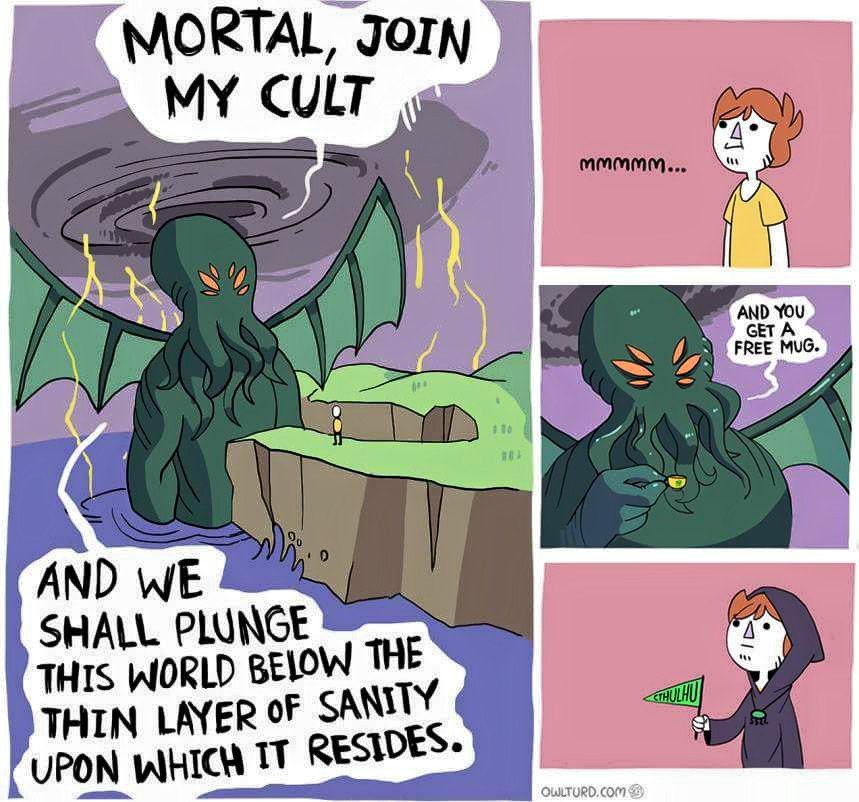 That is not dead which can eternal lie,
That is not dead which can eternal lie,And with strange aeons even death may die....
In his house at R'lyeh dead Cthulhu waits dreaming.
Ah yes, boys and girls, it's Cthulhu day.
So, when my wife and I got pregnant, I downloaded an app on my phone that allowed me to track baby's progress as she grew inside the womb. The app allows you to give the baby a nickname.
I chose Cthulhu.
This was primarily funny to me. Most of my family didn't understand, and they really didn't understand the Cthulhu plush I purchased for the baby either. And yet, the monthly pictures, Cthulhu is right there along side Zoey.
I did this, but I was a bad geek. I had never read "Call of Cthulhu". I hadn't read any Lovecraft at all. The anthology I purchased sat, tauntingly, on my bookshelf for two years before I decided this October was the time to do read it.
And yet, I still was drawn to Cthulhu. In a sense, Cthulhu is the icon of Lovecraftian lore. It is the totem of his works. It is probably the character that draws others into Lovecraft more than any other. And it's because of The Great Old Ones like Cthulhu that we figure it's worth reading what Lovecraft has written, even though we might be uncomfortable with his racism.
I'm not saying that Lovecraft had accidentally created a Cthulhu Cult, but I'm not not saying it either.
The story does not disappoint.
What's great about the story is the framing devices. Our main character, Francis Thurston, tells the story through documents found in his uncle's office. These documents detail vivid dreams and visions had by others. The uncle also has a small sculpture of Cthulhu. This causes Thurston to go looking for more information, and he finds second-hand accounts. There's the police raid on a Cthulhu Cult. An archaeological society talking about a statue, and the newspaper account of a ship that encountered the Great Cthulhu himself.
Thurston never does see Cthulhu. And yet, his very knowledge of Cthulhu puts him in danger. This gives a bit of a double meaning to the story's first line, "The most merciful thing in the world, I think, is the inability of the human mind to correlate all its contents." Later in the paragraph, "...some day the piecing together of dissociated knowledge will open up such terrifying vistas of reality, and of our frightful position therin, that we shall either go mad from the revelation or flee from the deadly light into the peace and safety of a new dark age."
Of course, Thurston "pieces together" the "dissociated knowledge" surrounding Cthulhu and figures out the truth. Now, he's not the only person who knows about the Great Old Ones. There is a Cthulhu Cult after all. But, he is an outsider and perhaps should not possess such information. And, while Thurston survives through the end of the story, he realizes him having that knowledge puts him in danger.
It is a dangerous thing to glimpse what is beyond reality, and Cthulhu undoubtedly is beyond the scope of reality. His very presence kills men from fear and drives others mad. His worshipers would kill people who possess information (and would rather die than giving it up).
I don't know what the worshipers of Cthulhu are hoping will happen once Cthulhu comes back. If anything, Lovecraft's literature stresses that the universe is uncaring, and humans are insignificant. Perhaps the Cthulhu Cult are trying to rationalize something that can not be rationalized. They are trying to place man's dominion over forces grander than they can even imagine. In a sense, it's a form of hubris. Moreso than trying to understand the universe and the gods, the Cthulhu Cult tries to control it.
There is no controlling Cthulhu or its mythos. It simply is.
Literary Connection: The story is said to be inspired in part by The Kraken. It's a really good sonnet, and Alfred Lord Tennyson invokes in 14 lines the same dread that is featured in Lovecraft's work. As Tennyson's sonnet builds, we know this thing that lurks at the bottom is something to be feared, this ageless wonder.
Madness Meter: I don't know if I would call the worshipers of Cthulhu as mad, but possibly. A few people go mad from actually seeing Cthulhu, if they don't outright die.
Is that racist? Not really in this piece.
Up Next: Pickman's Model, The Silver Key, The Strange House in the Mist.
No comments:
Post a Comment